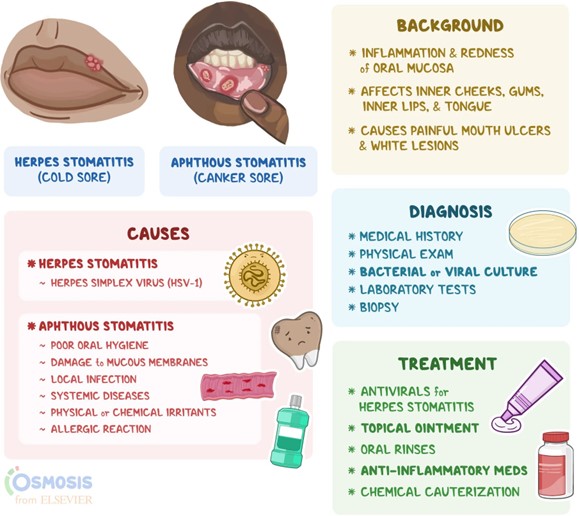A nurse is caring for a client who has stomatitis following radiation therapy. Which of the following is an appropriate intervention for the nurse to take?
Serve foods without sauces or gravies.
Instruct the client to drink liquids without a straw.
Offer mouth rinses with normal saline and water.
Serve foods while still at a hot temperature.
The Correct Answer is A
An appropriate intervention for a nurse caring for a client with stomatitis following radiation therapy would be to serve foods without sauces or gravies. Stomatitis is the inflammation of the mucous membranes in the mouth, which can cause pain and discomfort. Foods with sauces or gravies can irritate the affected areas and exacerbate the symptoms. Serving plain or bland foods can help alleviate discomfort and promote healing.
Instructing the client to drink liquids without a straw is not specifically related to stomatitis. The use of a straw may not have a direct impact on the condition. However, it is generally recommended to avoid using a straw when there are mouth sores or ulcers to prevent further irritation.
Serving foods while still at a hot temperature is not appropriate for a client with stomatitis. Hot foods can cause additional discomfort and may further irritate the inflamed tissues. It is advisable to serve foods at a cooler or lukewarm temperature to provide relief.
Offering mouth rinses with normal saline and water is not specifically related to stomatitis following radiation therapy. While mouth rinses can be helpful in maintaining oral hygiene and soothing oral tissues, the choice of rinse solution may vary depending on the client's condition and healthcare provider's recommendations. In some cases, a healthcare provider may prescribe a specific mouth rinse or provide instructions on the appropriate solution to use.

Nursing Test Bank
Naxlex Comprehensive Predictor Exams
Related Questions
Correct Answer is D
Explanation
Childhood obesity is associated with an increased risk of developing various health problems, and hypertension is one of the most common complications. Excess weight and adiposity can lead to increased blood volume and systemic inflammation, which can contribute to the development of hypertension. Long-standing hypertension in childhood can increase the risk of cardiovascular disease and other health issues later in life.
The other options are incorrect:
Juvenile rheumatoid arthritis is an autoimmune condition characterized by joint inflammation in children. While obesity can place additional stress on joints, it is not directly linked to the development of juvenile rheumatoid arthritis.
Type 1 diabetes mellitus is an autoimmune condition where the body's immune system mistakenly attacks and destroys insulin-producing cells in the pancreas. Obesity is not a known cause of type 1 diabetes.
Hypothyroidism is a condition where the thyroid gland does not produce enough thyroid hormone. While obesity can be associated with thyroid disorders, such as hypothyroidism, it is not a direct complication of childhood obesity.
Correct Answer is A
Explanation
Omega-3 fatty acids, specifically eicosapentaenoic acid (EPA) and docosahexaenoic acid (DHA), are mainly found in fatty fish. Since vegans avoid animal products, they may not consume adequate amounts of EPA and DHA. Plant-based sources of omega-3 fatty acids, such as flaxseeds, chia seeds, and walnuts, provide a different type of omega-3 called
alpha-linolenic acid (ALA), which can be converted to EPA and DHA in the body to some extent. However, this conversion is not very efficient, and the amount of EPA and DHA obtained from plant-based sources may be insufficient to meet the body's needs. Therefore, vegan individuals are at greater risk of omega-3 fatty acid deficiency.
Magnesium, potassium, and vitamin A deficiencies are not specifically associated with a vegan diet. These nutrients can be obtained from various plant-based sources. Magnesium can be found in foods such as legumes, nuts, seeds, whole grains, and leafy green vegetables.
Potassium is abundant in fruits, vegetables, legumes, and whole grains.
Vitamin A can be obtained from plant-based sources like carrots, sweet potatoes, spinach, and other dark leafy greens. However, it is important for individuals following a vegan diet to ensure they consume a varied and balanced diet to meet their nutritional needs for these and other essential nutrients.
Whether you are a student looking to ace your exams or a practicing nurse seeking to enhance your expertise , our nursing education contents will empower you with the confidence and competence to make a difference in the lives of patients and become a respected leader in the healthcare field.
Visit Naxlex, invest in your future and unlock endless possibilities with our unparalleled nursing education contents today
Report Wrong Answer on the Current Question
Do you disagree with the answer? If yes, what is your expected answer? Explain.
Kindly be descriptive with the issue you are facing.
